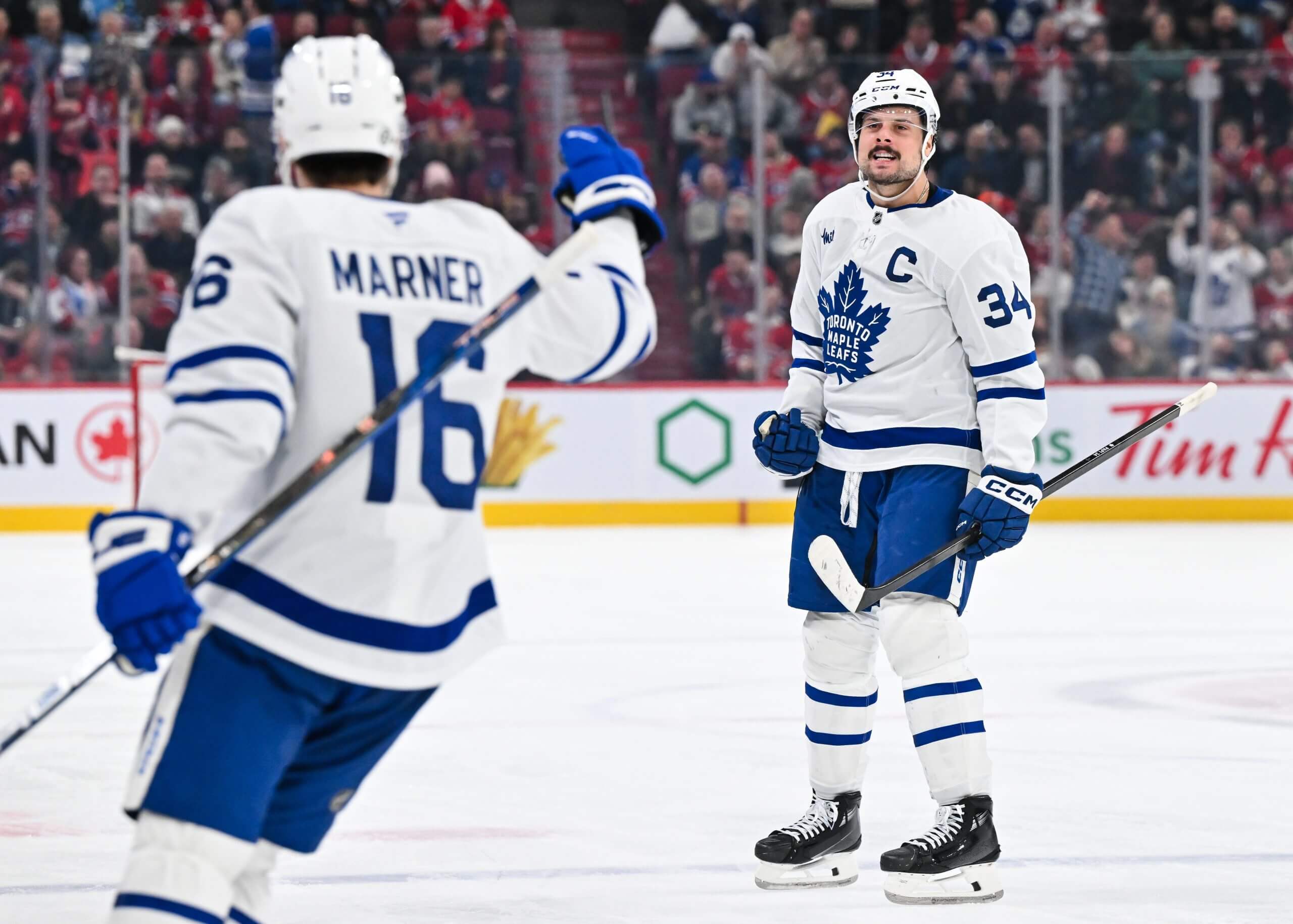Mercifully, the Mitch Marner saga is finally over.
There will be no more strained contract talks, not after signing an eight-year deal that takes him to age 36. No more angry debates in the fan base about the “Core Four” and who is to blame, especially come playoff time. No more not-so-veiled leaks to the local media and national press.
In the end, Marner only really wanted to go to Las Vegas, a city on the other side of the continent, in another conference, in a literal desert that’s a world away from hockey-mad Toronto. The idea of a bunch of teams lining up for a UFA parade for his services on July 1 wasn’t ever going to matter, not when there was so much mutual interest between the player and the Golden Knights, to the extent he signed for a below-market rate of $12 million a season over the max term.
Marner was even willing to waive to go there during the season — unlike the other alternatives he was presented with — and Vegas remained at the top of his list throughout this painful divorce from the Maple Leafs.
Had that three-way deal gone through before the trade deadline, a blockbuster that would have had the Leafs land Mikko Rantanen and Marner end up in Vegas, the narratives around this all would likely have been so much different.
Instead, the Leafs get only third-line center Nicolas Roy as part of the sign-and-trade. And a big pile of cap space — $11 million of which went to Marner the past six seasons — without anything significant to spend it on when free agency opens on Tuesday.
In Toronto, Marner will be remembered in some ways as a cautionary tale: a local boy who got to live his dream — the quintessential Canadian dream of starring for his hometown NHL team — and had it become a nightmare.
The reality is that in an ideal world, this split would have happened years ago, avoiding the toxicity that settled in the past two years between the player, his team and this market. Had Marner been traded in 2023, after seven playoff disappointments and before his no-movement clause kicked in, there wouldn’t have been talk of him being a villain. Just another talented player that got away.
I believe Marner will likely thrive in Vegas. For one, he chose a place where he’ll be an addendum to a top team, not the star attraction. He also took less than he could have received on the open market — as much as $3 million less per season — and will be surrounded by veteran stars like Jack Eichel, Mark Stone and Shea Theodore who have already established a winning culture. And his cap hit will look better and better as the NHL’s salary ceiling stretches to $140 million (and possibly beyond) over the life of the deal.
The media and fan pressure will be substantially lower. The temperature away from the rink, and on social media, will be on another level in a fledgling market that has only known success. In those circumstances, Marner should be able to play unburdened, the way he did earlier in his career when he was often the best player on the ice.
In Marner, the Golden Knights are getting one of the top offensive talents in the league in his prime, and someone who has been one of the most exciting players to watch in the salary-cap era. Over the past five seasons, Marner’s 1.25 points per game sit behind only five players leaguewide, a list of the top weapons in the NHL: Connor McDavid, Nikita Kucherov, Nathan MacKinnon, Leon Draisaitl and former teammate Auston Matthews.

Mitch Marner and Auston Matthews combined for a remarkable duo with the Leafs. (Minas Panagiotakis / Getty Images)
Marner is the only member of that group who has also been a Selke Trophy finalist as the top defensive forward in the league and is known as much for his penalty killing and two-way intelligence as his playmaking, vision and ability to pile up 100 points a season.
Yes, he’s undersized at 6-foot and 180 pounds, and yes, there will be questions about how his game translates to the postseason that will follow him to Vegas. But so much of what went wrong in Toronto ultimately became about the team, the market and the dream gone wrong. It was more about Marner’s struggles to compartmentalize and excel when the pressure ramped up in that environment, not necessarily the playoffs themselves.
Along the way, some of those challenges were exacerbated by those around him, which created more negativity and, in turn, more “noise” to tune out and play through. Maybe some players could have done that and pushed through. Marner wasn’t able to, despite the Leafs’ attempts to support him, including bringing in renowned experts to help.
It’s also fair to say he had a lot of company in terms of failing to deliver in the postseason, given how often the Leafs’ core came up small in the biggest games.
Will that follow him to Nevada, and Marner will continue to struggle in the postseason? It’s possible. The reason so many NHL teams were preparing to line up and bid for his services on Tuesday is that executives around the league — including many from top teams — believe this is a player who is afflicted more by being in Toronto than anything innate.
They believe that Marner playing somewhere else will result in a better version of one of the best players in the sport, even in the playoffs.
It will be interesting to see how the relationship between Marner and his hometown develops from here. There’s no doubt he’ll be booed next season on the one night Vegas comes through town, but how long will that animosity among the fan base last, given how much of the error here was on management?
I’ve seen fans compare this to the Vince Carter situation in the NBA, where the 2004 divorce from the Raptors was painful and pronounced. Twenty years later, it was ultimately smoothed over with a moving standing ovation, tears and a jersey retirement.
By the numbers, Marner is one of the best Leafs players of all time. He’s fourth in career assists and fifth in points, trailing only franchise icons Mats Sundin, Darryl Sittler, Dave Keon and Borje Salming, all of whom have their numbers retired and Legends Row statues outside of Scotiabank Arena. He is also the only Leaf to be named a first-team All-Star more than once since Frank Mahovlich and Tim Horton in the 1960s.
Of that group, only Keon left in as strained a situation as this — and it took many decades for that relationship to be repaired.
With how high the level of frustration is in the Toronto fan base right now, that’s all going to be hard to fully process today (as I’m sure we’ll see in the comments below). At some point, I do think there will be a reconciliation here, with recognition of how special a player Marner was.
Even if it didn’t end the way anyone would have wanted when he was drafted fourth overall 10 years ago, almost to the day.
(Top photo: Nick Turchiaro / Imagn Images)
